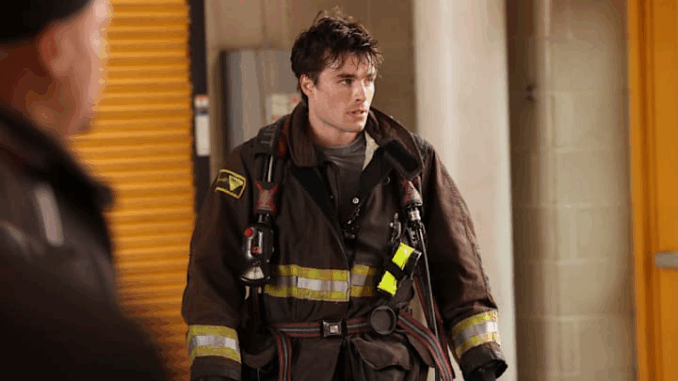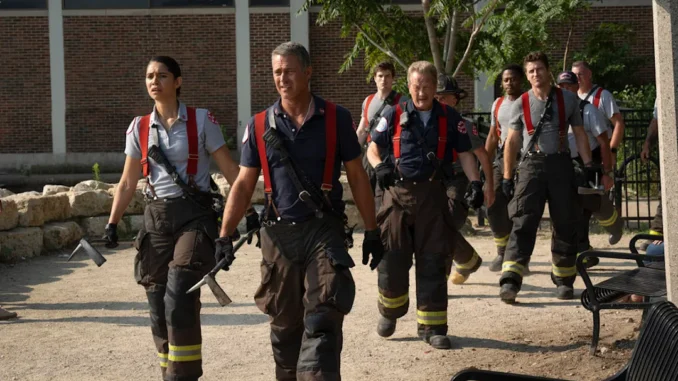
In Episode 5 of Chicago Fire Season 13, a quiet absence confirmed what many fans feared: Jack Damon is gone. But unlike the fiery farewells the series is known for, this exit smoldered beneath the surface—calm, character-driven, and deeply intentional.
After just a short stint at Firehouse 51, Michael Bradway’s Jack Damon has exited Chicago Fire—and although the show hasn’t spelled it out in bold letters, the writing has been on the wall since Episode 3. Damon’s arc was a flash of heat that quickly simmered down, leaving behind a surprisingly mature and satisfying conclusion that respected both the character’s legacy and the ever-shifting dynamics of 51.
A Promising Beginning, a Sudden Shift
Damon was first introduced with fanfare in Season 14—yes, that confusing flash-forward in Firehouse chronology, as the show overlaps timeline elements across seasons. Fresh from the academy, Jack Damon came in with heavy expectations: the last name Severide carries weight, and though he never claimed it, audiences knew exactly who he was.
Early episodes hinted at inner conflict and external tension. Damon’s eagerness clashed with the high standards of 51, and when he directly disobeyed a call order from Stella Kidd in Episode 3, the consequences were swift. Kidd pulled Damon from the company, putting him back into the floater pool. That move might have ended his journey, but it was only the start of something more reflective.
Brotherhood Tested, Bonds Repaired
Damon’s confrontation with Kelly Severide was raw, emotionally charged, and—if we’re honest—necessary. For a show that often thrives on explosive action, Chicago Fire handled this moment with notable restraint. The brothers didn’t erupt; they unraveled.
In Episode 4, we learned Damon had landed at Firehouse 20 and was thriving. More importantly, Severide visited him—not to chastise, but to encourage. He explained to 20’s lieutenant that Firehouse 51 wasn’t the right environment for someone like Damon right now, especially amid constant leadership shifts and emotional turbulence. In one of the show’s most touching Season 13 moments so far, Severide urged Damon to stop chasing a name and start building his own legacy.
It wasn’t a blaze of glory—it was a quiet passing of the torch.
Exit Confirmed in Silence
By Episode 5, Damon was neither seen nor mentioned. And in Chicago Fire, silence often speaks volumes. When the show intends to write someone out completely, it rarely does so without at least a beat of closure. Damon got that. He didn’t need a dramatic final rescue or tragic send-off. His arc was complete.
The decision to close the door so subtly is one that longtime fans might appreciate. With a sprawling ensemble cast and constant turnover at Firehouse 51, not every character gets—or needs—a climactic goodbye. Damon’s exit fits the rhythm of real life more than television: sometimes, people leave quietly, with grace and dignity, to pursue something better suited to them.
Why It Was the Right Time
Firehouse 51 has been in a constant state of flux. With Brett’s departure, Boden’s role shifting, and Severide himself in and out of Chicago, it’s not an ideal space for a rookie to find his place. Damon’s move to Firehouse 20 allows him to grow on his own terms.
Narratively, it also trims the fat. The show has to manage screen time among major players—Casey’s returns, Violet’s grief, Cruz’s evolution, and now, Sam Carver’s deepening arc. Damon’s story was always a supporting note in a bigger composition. Rather than stretching his arc thin, Chicago Fire gave it a natural endpoint.
Will We See Damon Again?
Never say never.
The door was left open with care. Damon didn’t exit under a cloud; he didn’t break bonds or burn bridges. In fact, Chicago Fire went out of its way to mend his relationship with Severide before letting him go. That’s not an accident. It’s a promise. Should the show ever revisit Firehouse 20—or should a major incident require all hands on deck—we wouldn’t be surprised to see Bradway return, suited up and stronger than ever.
And wouldn’t that be a story? A rookie once dismissed from 51, now returning as a hardened firefighter with experience, ready to earn a permanent place on the team that once sent him away.

The Bigger Picture
Damon’s departure is more than a footnote—it’s a quiet testament to how Chicago Fire continues to evolve. Not every goodbye needs flames and sirens. Sometimes, the most powerful exits happen in the calm—when one character moves on so that another can grow.
So here’s to Jack Damon: may he make a name for himself, just as Severide hoped. And if we’re lucky, perhaps we haven’t seen the last of that name on the call sheet just yet.